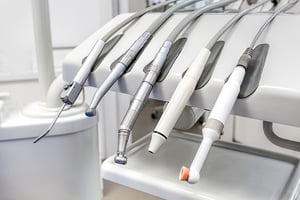
At Dental & Medical Counsel, we understand that managing cancellations and no-shows is a critical challenge for dental offices. These occurrences disrupt your schedule and impact your practice's productivity and profitability. Through strategic planning and effective communication, you can significantly reduce the frequency of these events. This article provides insights and strategies to effectively help dental practices manage and reduce cancellations and no-shows.
Cancellations and no-shows can significantly disrupt your dental practice's daily operations. They lead to lost revenue, underutilization of staff, and wasted resources. For each unfilled appointment, your practice loses an opportunity to serve another patient in need, potentially affecting patient satisfaction and retention. These missed appointments also delay treatment for patients, which can lead to worsened oral health conditions.
In addition, frequent cancellations and no-shows can strain your relationship with patients. When patients fail to show up for scheduled appointments without notice, it can disrupt your practice's workflow, causing frustration among your staff and other patients. Over time, this can lead to a negative perception of your practice, affecting your reputation in the community. Implementing strategies to reduce these occurrences can significantly improve operational efficiency and patient care quality.

Effective communication is crucial in reducing the number of no-shows and cancellations at your dental practice. It starts with educating patients about the importance of their appointments and the impact of missing them. Clear, concise communication about the consequences of no-shows for their oral health and for the practice helps patients understand the importance of keeping their appointments.
Another key strategy is sending appointment confirmations and reminders. Consistent reminders, whether through phone calls, texts, or emails, can help reduce forgetfulness, one of the primary reasons for missed appointments. Tailoring the communication method to each patient's preference ensures the message is received and acknowledged. Establishing a personal connection through communication can also make patients feel valued, increasing their likelihood of showing up.
Technology plays a significant role in managing appointments and reducing no-shows. Implementing an automated reminder system can streamline the process of sending out appointment confirmations and reminders. This saves your staff time and ensures that patients receive timely notifications about their upcoming visits.
Online scheduling systems allow patients to book, change, or cancel appointments at their convenience. This accessibility can lead to fewer cancellations, as patients can easily adjust their appointments to fit their schedules. Moreover, leveraging technology to track patient behavior can help identify patterns or trends in no-shows and cancellations, enabling targeted interventions to address the underlying causes.
Personalizing patient reminders can significantly improve appointment attendance rates. Addressing patients by name and including specific details about their appointments in reminders can make communication feel more personal and less automated. This approach shows patients that you value their individual needs and are actively preparing for their visit.
Furthermore, personalizing reminders based on patient preferences for communication (text, email, or phone call) ensures that the message is delivered in the most effective way. You foster a positive relationship by acknowledging and respecting their preferences while encouraging them to honor their appointments. Personalized reminders can also include educational content about the importance of regular dental visits, further motivating patients to keep their appointments.
Establishing a clear policy for cancellations and no-shows is essential for managing them effectively. This policy should outline the practice's expectations for appointment cancellations, including the required notice and any fees associated with late cancellations or no-shows. From the start, communicating this policy to patients sets clear expectations and emphasizes the importance of respecting appointment times.
The policy should also include provisions for exceptions in cases of emergencies or unforeseen circumstances. By being fair and consistent in applying the policy, your practice demonstrates a commitment to accountability and compassion. This balance is key to maintaining positive patient relationships while discouraging preventable cancellations and no-shows.

An active short call list is an effective tool for filling unexpected gaps in your schedule. This list should include patients who are willing to come in for appointments on short notice. When a cancellation or no-show occurs, quickly contacting individuals on this list can help you fill the slot, minimizing lost productivity.
To maximize the effectiveness of your short call list, keep it updated with current patient information and preferences. Regularly communicating with patients on this list can keep them engaged and ready to take advantage of last-minute openings. This strategy reduces the impact of cancellations and no-shows and serves patients who may be waiting for an earlier appointment.
A personal call from the dentist can have a powerful impact on reducing no-shows, especially for new patients. This gesture demonstrates the practice's commitment to personal care and builds a direct relationship with the patient. It can also address any concerns or anxieties the patient may have about their upcoming visit, increasing their comfort level and commitment to attending.
For existing patients, a call from the dentist following a missed appointment can convey the importance of their continued oral health care. This direct communication can encourage patients to reschedule missed appointments and maintain their treatment plans, reinforcing the value of regular dental visits.
It is crucial to train your staff to handle cancellations and no-shows with empathy and efficiency. Staff should understand how to apply the practice's policies consistently while also being able to assess individual situations for extenuating circumstances. This balance is key to maintaining patient relationships while minimizing the impact of missed appointments.
Furthermore, empower your staff with the skills and scripts to effectively communicate the importance of appointments to patients. This includes training on how to handle cancellation calls, motivate patients to reschedule, and convey the value of consistent dental care. A well-trained staff can significantly reduce the frequency of cancellations and no-shows, enhancing the overall productivity of your practice.
Introducing patient pre-payments for certain types of appointments can serve as a commitment device, reducing the likelihood of no-shows. Patients who have already invested in their appointments are more likely to attend. Offering incentives, such as discounts for advance payments or loyalty rewards for consistent attendance, can motivate patients to keep their appointments.
In implementing these strategies, it's important to communicate the benefits clearly to patients. Explaining how pre-payments and incentives work in the practice's favor and benefit the patient by ensuring timely access to care and potential savings can foster acceptance and participation in these programs.
Upgrading your practice management software can streamline appointment scheduling, reminders, and follow-ups, significantly reducing administrative burdens. Look for software that offers automated reminder and confirmation features, online scheduling capabilities, and the ability to track patient appointment histories.
Modern practice management systems can also provide insights into no-show and cancellation patterns, helping you identify areas for improvement. By leveraging these technologies, your practice can enhance operational efficiency, improve patient communication, and reduce the incidence of missed appointments.
Frequently Asked Questions
Q: Why are cancellations and no-shows a problem for dental practices?
A: Cancellations and no-shows disrupt daily operations, leading to lost revenue, underutilization of staff, and wasted resources. They can delay treatment for other patients and negatively impact patient satisfaction and retention.
Q: What is the first step in reducing no-shows at a dental office?
A: Effective communication is crucial. This involves educating patients about the importance of keeping appointments and the consequences of missing them, as well as sending timely appointment confirmations and reminders.
Q: How can technology help manage appointments more effectively?
A: Technology such as automated reminder systems and online scheduling can streamline the confirmation and reminder process, make scheduling more accessible to patients, and track patterns in patient behavior that could lead to targeted interventions.
Q: Why is personalizing patient reminders important?
A: Personalized reminders address patients by name and tailor communication to their preferences (e.g., text, email, or phone), making messages feel more personal and less automated. This can increase the likelihood of patients attending their appointments.
Q: What should a cancellation and no-show policy include?
A: A clear policy should outline the required notice for cancellations, any fees for late cancellations or no-shows, and exceptions for emergencies. It sets expectations and helps manage these events effectively.
Q: What is the benefit of having a short call list?
A: A short call list includes patients who can come in at short notice. It allows the practice to fill cancellations quickly, minimizing productivity loss and maximizing resource utilization.
Q: How can direct calls from the dentist help reduce no-shows?
A: Calls from the dentist, especially to new or absent patients, can create a personal connection, address any concerns, and emphasize the importance of attending scheduled appointments, which can significantly increase attendance rates.
Q: What are effective follow-up strategies for missed appointments?
A: Immediate follow-up can help quickly reschedule missed appointments. Offering flexible rescheduling options, maintaining regular communication, and addressing specific barriers to attendance can also reduce future no-shows.
Q: How should practices communicate appointment policies to patients?
A: Policies should be clearly communicated at the first appointment, and the importance of appointments should be emphasized during scheduling. Asking for a commitment during booking can also reinforce the importance.
Q: What training should staff receive to manage cancellations and no-shows effectively?
A: Staff should be trained to handle cancellations and no-shows with empathy and efficiency, applying policies consistently while assessing individual situations. Training should also include how to effectively communicate the importance of keeping appointments.
Q: How can pre-payments and incentives reduce no-shows?
A: Introducing pre-payments for certain types of appointments can act as a commitment incentive for patients, and offering discounts or rewards for attendance can motivate patients to keep appointments.
Q: What are the benefits of upgrading practice management software?
A: Upgraded software can improve scheduling, reminders, and follow-ups, reduce administrative burdens, and provide insights into no-show and cancellation patterns, enhancing overall practice efficiency.
At Dental & Medical Counsel, we've been instrumental in realizing the practice goals of countless dentists. Whether you're looking to purchase, launch, or sell a dental practice, our expertise is your guide. Beyond the initial stages, we're committed to ensuring your dental practice remains legally compliant.
We provide comprehensive support, including employment law protections, dental contract reviews, and assistance with dental employment agreements. Additionally, we specialize in incorporating dental practices and securing trademarks. And for long-term planning, our services extend to helping dentists with succession and estate planning. Trust us to be your partner in every step of your dental practice journey.
.jpg?width=300&height=396&name=Ali%20Website%201_edited%20(1).jpg)
About Ali Oromchian, Esq.
Your Dental Lawyer
Ali Oromchian, JD, LL.M., is a leading legal authority in dental law and the founding attorney of Dental & Medical Counsel, PC, with over two decades of experience. His deep connection to dentistry comes from his wife's nearly two-decade-long career as a pediatric dentist.
This personal insight fuels his dedication to empowering dentists to navigate their legal challenges and achieve their practice goals. In doing so, Ali has helped thousands of doctors open their practices while maintaining legal compliance.
Ali is frequently quoted and contributes articles to dental publications, including the California Dental Society, Progressive Dentist, Progressive Orthodontists, Dentistry Today, Dentaltown, and The New Dentist magazines, further showcasing his commitment to the dental community.

Stay updated with industry news!
1904 Olympic Blvd, Suite 240
Walnut Creek, CA 94596
Phone: 925-999-8200
Fax: 925-884-1725
frontdesk@dmcounsel.com
| Monday | 8:00AM - 6:00PM |
| Tuesday | 8:00AM - 6:00PM |
| Wednesday | 8:00AM - 6:00PM |
| Thursday | 8:00AM - 6:00PM |
| Friday | 8:00AM - 6:00PM |
| Saturday | Closed |
| Sunday | Closed |